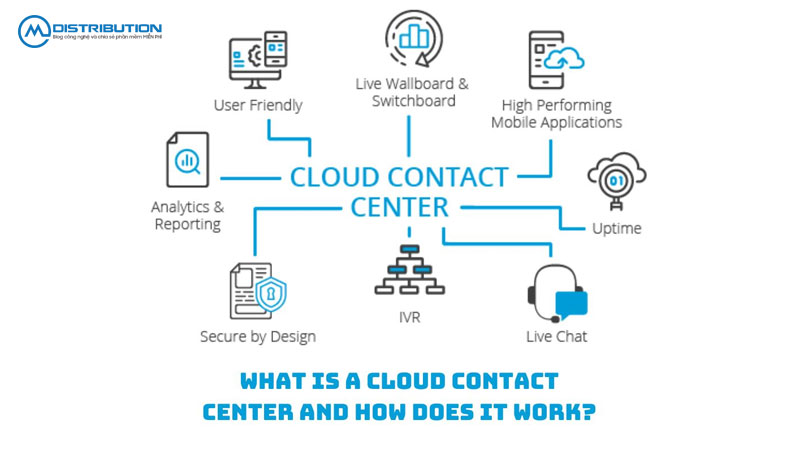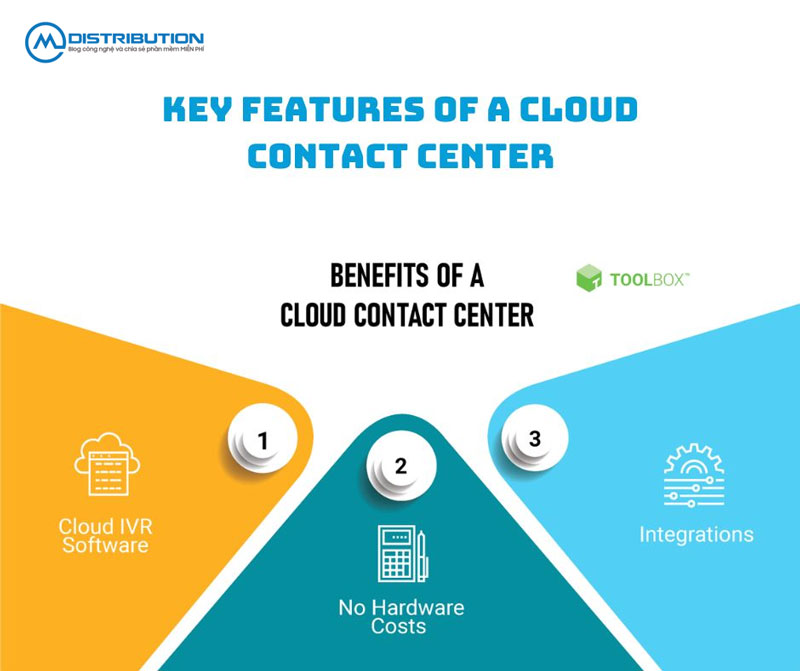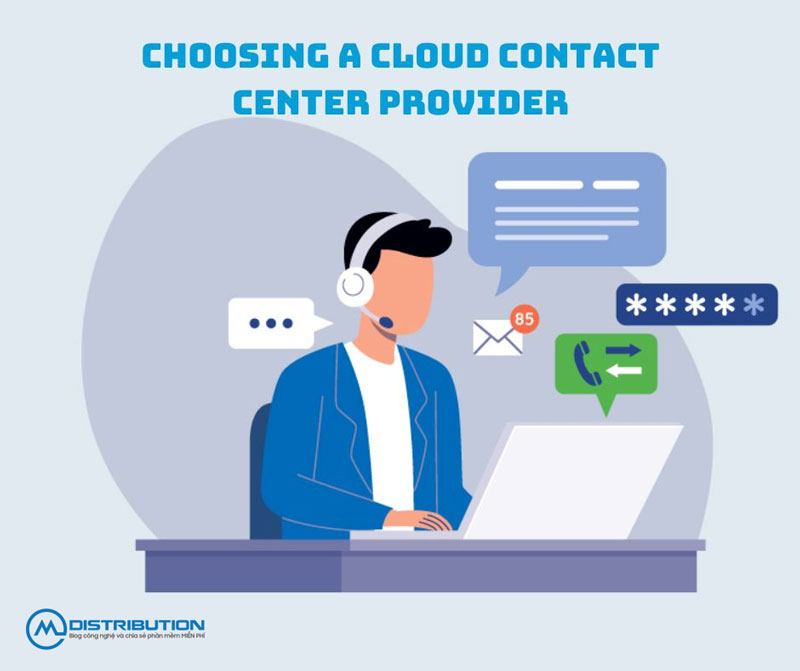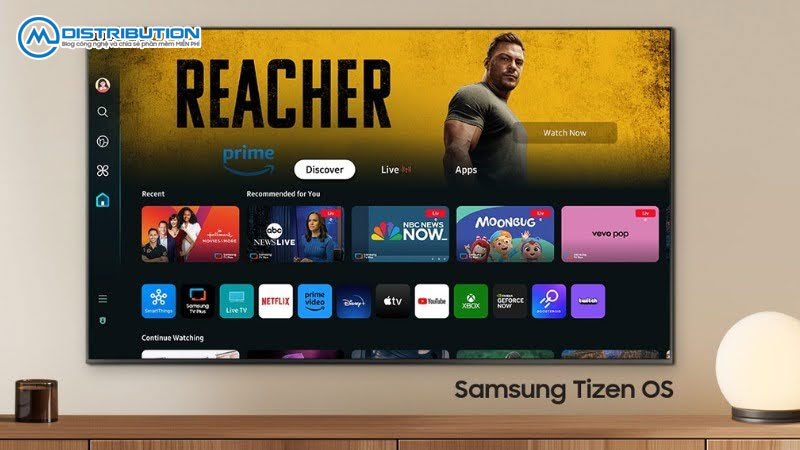
Providing exceptional customer service is more vital than ever in today’s corporate market. What Is a Cloud Contact Center? Customers want quick, customized service across various channels, and firms must be able to meet those expectations in order to compete. Many firms are responding to these needs by installing a cloud contact center. In this post, we’ll look at what is a cloud contact center, how it works, and why it’s becoming a popular company option.
What Is a Cloud Contact Center?
The question What Is a Cloud Contact Center is very popular, and there is an answer. A cloud contact center is a call center or customer service operation that is hosted in the cloud, rather than on-premises. The concept of cloud computing allows businesses to access software, data storage, and other resources over the Internet, rather than having to manage these resources in-house. A cloud contact center operates in a similar way, with all of the necessary software and hardware hosted in the cloud and accessed through an internet connection.
What Is a Cloud Contact Center? One of the main advantages of a cloud contact center is that it can be more cost-effective and flexible than an on-premises solution. With an on-premises contact center, businesses have to invest in expensive hardware and software, as well as hiring and training staff to manage the system. What Is a Cloud Contact Center? A cloud contact center, on the other hand, can be set up quickly and easily, with minimal upfront costs. Businesses can also scale up or down as needed, depending on call volume or seasonal fluctuations.
How Does a Cloud Contact Center Work?

What Is a Cloud Contact Center and how does it work? A cloud contact center is made up of several different components that work together to provide a seamless customer experience. These components include:
Virtual Phone Systems
A cloud contact center typically uses a virtual phone system that allows agents to make and receive calls over the Internet. This eliminates the need for traditional phone lines and hardware, which can be costly and difficult to manage.
Interactive Voice Response (IVR)
An IVR system is used to greet callers and route them to the appropriate agent or department. This can help to reduce wait times and improve the efficiency of the contact center.
Automatic Call Distributor (ACD)
An ACD system is used to route incoming calls to the most appropriate agent based on factors like agent availability, skill set, and customer history.
Customer Relationship Management (CRM)
A CRM system is used to manage customer interactions and track customer data. This allows agents to provide personalized service and support, as well as identify opportunities for upselling or cross-selling.
These components work together to provide a seamless customer experience across multiple channels, including phone, email, chat, and social media.
Key Features of a Cloud Contact Center

In addition to these core components, a cloud contact center typically includes several key features that can help businesses provide better customer service and improve operational efficiency. These features may include:
Omnichannel Support
A cloud contact center can provide support across multiple channels, allowing customers to choose the channel that’s most convenient for them.
Real-time Analytics
A cloud contact center can provide real-time data on call volume, wait times, and other key metrics. This can help businesses identify areas for improvement and make data-driven decisions.
Intelligent Routing
An intelligent routing system can use data like customer history and agent skill set to route calls to the most appropriate agent.
Predictive Dialer
A predictive dialer can be used to automate outbound calls, allowing agents to focus on more complex customer interactions.
Choosing a Cloud Contact Center Provider

When choosing a cloud contact center provider, there are several factors that businesses should consider. What Is a Cloud Contact Center and How Does It Work?
These may include:
Pricing – Cloud contact center providers typically charge a monthly fee based on the number of agents and features included. Businesses should compare pricing across different providers to find the best value for their needs.
Reliability – Because a cloud contact center relies on an internet connection, it’s important to choose a provider with a reliable network and uptime guarantee.
Customer Support – Businesses should look for a provider with excellent customer support, including 24/7 availability and a dedicated account manager.
Integration – A cloud contact center should be able to integrate seamlessly with other business systems, such as marketing automation and sales CRM.
Some of the best cloud contact center providers?
There are many cloud contact center providers on the market, each with their own strengths and weaknesses. When choosing a provider, businesses should consider factors like pricing, reliability, customer support, and features. Here are some of the best cloud contact center providers to consider:
Amazon Connect
Amazon Connect is a cloud-based contact center solution that’s part of Amazon Web Services (AWS). It’s designed to be scalable, flexible, and easy to use, with features like automatic call distribution, interactive voice response, and real-time metrics. Pricing is based on usage, with no upfront costs or long-term commitments.
Twilio Flex
Twilio Flex is a cloud-based contact center platform that’s built on the Twilio communications platform. It’s highly customizable, with an API-driven architecture that allows businesses to build their own contact center applications. Twilio Flex includes features like omnichannel support, intelligent routing, and real-time reporting.
Genesys Cloud
Genesys Cloud is a cloud contact center platform that’s designed to be easy to use and highly scalable. It includes features like automatic call distribution, interactive voice response, and real-time analytics. Genesys Cloud is also highly customizable, with the ability to integrate with other business systems like CRM and marketing automation.
RingCentral Engage Voice
RingCentral Engage Voice is a cloud-based contact center solution that’s part of the RingCentral communications platform. It includes features like automatic call distribution, interactive voice response, and real-time analytics. RingCentral Engage Voice is also highly customizable, with the ability to integrate with other RingCentral products like video conferencing and messaging.
Five9
Five9 is a cloud contact center platform that’s designed to be scalable and easy to use. It includes features like automatic call distribution, interactive voice response, and real-time analytics. Five9 is also highly customizable, with the ability to integrate with other business systems like CRM and workforce management.
Talkdesk
Talkdesk is a cloud contact center platform that’s designed to be easy to use and highly scalable. It includes features like automatic call distribution, interactive voice response, and real-time analytics. Talkdesk is also highly customizable, with the ability to integrate with other business systems like CRM and marketing automation.
Cisco Webex Contact Center
Cisco Webex Contact Center is a cloud-based contact center platform that’s part of the Cisco Webex collaboration suite. It includes features like automatic call distribution, interactive voice response, and real-time analytics. Cisco Webex Contact Center is also highly customizable, with the ability to integrate with other Cisco products like video conferencing and messaging.
When choosing a cloud contact center provider, it’s important to evaluate the features and pricing of each provider to find the best fit for your business. It’s also a good idea to read reviews and speak with other businesses that have used the provider to get a sense of their experience.
Conclusion
A cloud contact center can be a powerful tool for businesses looking to improve their customer service and operational efficiency. By hosting their contact center in the cloud, businesses can save money, scale up or down as needed, and provide support across multiple channels. With the right provider and features, a cloud contact center can help businesses meet the demands of today’s customers and stay ahead of the competition.








